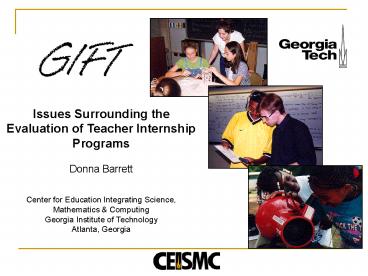Issues Surrounding the Evaluation of Teacher Internship Programs - PowerPoint PPT Presentation
1 / 22
Title:
Issues Surrounding the Evaluation of Teacher Internship Programs
Description:
Issues Surrounding the Evaluation of Teacher Internship Programs Donna Barrett Center for Education Integrating Science, Mathematics & Computing – PowerPoint PPT presentation
Number of Views:518
Avg rating:3.0/5.0
Title: Issues Surrounding the Evaluation of Teacher Internship Programs
1
Issues Surrounding the Evaluation of Teacher
Internship Programs Donna Barrett Center for
Education Integrating Science, Mathematics
Computing Georgia Institute of Technology Atlanta,
Georgia
2
- . a collaborative effort of corporations,
universities and school districts designed to
enhance mathematics and science experiences of
Georgia teachers and their students. Since 1991,
teachers have been placed in over 1100 GIFT
internships throughout the state.
3
Goals of
- Increasing the teachers personal knowledge base
of science, mathematics and technology - Enhancing the teachers enthusiasm for teaching
- Providing access to new techniques and procedures
- Encouraging partnerships with business and
education
4
The GIFT Experience - Commonalities
- Common application
- Internship in STEM-based work setting
- Emphasis on Real World problem solving and
reasoning - Development of Inquiry Based Unit Action Plan
5
The GIFT Experience - Variables
- Location of placement
- University
- Corporate
- Informal science/public education
- Goal of placement
- Traditional
- Student research
- International
- Curriculum development
- Length of placement
- 4-8 weeks
6
The GIFT Experience - Variables
- Geography
- Placements across Georgia
- Teaching Level
- High school vs. middle school
- Teaching Field
- Science, math, technology, social science
- Type of school
- affluent vs. low income, stable vs. changing,
minority vs. majority
7
GIFT Evaluation Plan
- An Advisory Board composed of 25 members from
corporations, universities, and school districts - Utilizes the strategy of subcommittee phone
conferences to provide guidance on program issues
such as evaluation - Evaluation subcommittee has provided input on
program evaluation - Worked with an internal evaluator to develop a
GIFT Logic Model and develop assessments
8
Assessing Impact on Teachers
- Participant Reactions
- Numbers
- Are participants satisfied?
- Teacher and Mentor Surveys
- Participant Learning
- Action Plan Analysis
- What have teachers learned about inquiry based
learning?
GIFT Logic Model adapted from Guskeys 5 Level
Model for Assessing Professional Development
9
Assessing Impact on Teachers
- Participant Actions
- How have they applied inquiry based learning in
their classroom? - Surveys Pre-Summer, Post-Summer School Year
Follow-up (Post-GIFT) - Alumni Survey
- Classroom Observation
GIFT Logic Model adapted from Guskeys 5 Level
Model for Assessing Professional Development
10
Pre and Post Surveys
Based on surveys from www.retnetwork.org
11
Assessing Impact on Teachers
- Organizational Change
- Change in school infrastructure
- Teachers as agents of change
- Alumni Survey
- Focus Group Discussions
- Classroom Observation
GIFT Logic Model adapted from Guskeys 5 Level
Model for Assessing Professional Development
12
GIFT Alumni Survey
- Searching for 668 former participants
- GIFT database/Districts/Websites/Searches
- 123 Fellows No contact information
- 545 Contact Attempts 382 E-mail 163 mailed 36
E-mail and/or mail returned - 509 Total Sample Size
- 127 - Surveys returned
- Return Rate 25
13
To what extent, if any, do you feel that you
experienced each of the following types of
learning as a result of your participation in
GIFT?
Strongly Agree or Agree
I gained a greater understanding of the applications science, mathematics, and/or technology in every day life. 93.10
I gained greater understanding of fundamental concepts in science, mathematics or technology. 84.30
I increased my knowledge of current issues in scientific or mathematical research. 91.20
I increased my knowledge of careers that utilize science, mathematics, and/or technology. 95.10
I gained an appreciation of the difficulties some students encounter when learning new material. 78.50
It increased my comfort level with inquiry-based learning strategies. 76.00
It increased my ability to incorporate "real life" examples of the subjects I teach. 96.10
14
Leadership Roles
- 16 reported they became a department or grade
level chair person AFTER their GIFT experience - 21 reported they became a school district leader
(Principal, AP or Coordinator) AFTER their GIFT
experience
15
(No Transcript)
16
(No Transcript)
17
Limitations of Data
- The data is self reported, although anonymous
- Return rate of Alumni Survey 25
- Sample sizes often vary on the pre and post
surveys - Focus Groups have provided more specific
information
18
Challenges in Correlating Student Achievement
with Teacher Professional Development
- Designing a scientifically valid study with
appropriate controls - Appropriate measures of student achievement
across grade levels, subjects - Access to student achievement data
- Teachers changing schools, subjects and grade
levels
19
Assessing the Impact on Students
- Student Achievement
- Connecting the dots through a literature review
- Encouraging the use Research based best practices
(Inquiry, Problem Based Learning, etc.) - Impacting teacher content knowledge
GIFT Logic Model adapted from Guskeys 5 Level
Model for Assessing Professional Development
20
Future Evaluation Goals
- Collect student achievement data of GIFT
participants proposed study with a local school
district to collect preliminary data - Criterion-Referenced Competency Tests (CRCT)
Middle Grades - End of Course Test (EOCT ) High School
- Biology, Physical Science, Algebra, Geometry
- Aggregate data from specific class and compare to
state average - Pre GIFT data, Post GIFT data, YR 1, YR 2 Post
21
Evaluation Tools/Resources
- Columbia Program http//scienceteacherprogram.org
/ - Industry Initiatives for Science and Math
Education (IISME) www.iisme.org - RET Network Surveys www.retnetwork.org
- SWEPT study www.sweptstudy.org
- TRE Conference on Research Experiences.
http//omp.gso.uri.edu/CTRE/ - Visiting a High School Inquiry Classroom How to
Prepare and Observe http//cse.edc.org/pdfs/produ
cts/observerguide.pdf
22
For more information
- Donna Barrett
- Program Director
- donna.barrett_at_ceismc.gatech.edu
- (404) 894.7530
- www.ceismc.gatech.edu/gift































